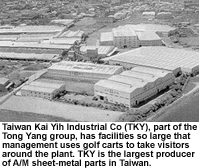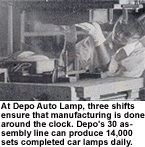This month, BodyShop Business won’t limit its look at Taiwanese parts manufacturers to just the sheet-metal product producers. Two companies –– one specializing in sheet-metal parts and one focused on auto lamp production –– get analyzed.
This spring, a number of industry professionals toured Taiwan and some of its aftermarket (A/M) parts manufacturers. This tour, along with one taken in the spring of 1999, marks the second such prominent trip within a year. Views from both trips are presented here. Hopefully, the more information the industry has on where A/M parts come from, the better off individual shop owners will be since they’ll be able to make more informed decisions. More knowledge never hurt anybody, except maybe Galileo.
Tong Yang Group
Taiwan Kai Yih (TKY) is the sheet-metal division of Tong Yang Industries, a group that’s been around since 1952 when they initially manufactured bicycle parts.
TKY started in 1972 as a producer of bicycle and motorcycle parts. By 1987, TKY was manufacturing A/M sheet-metal parts. Today, TKY enjoys its status as the largest automotive sheet-metal producer in the country. How large is the facility?
"We had to ride golf carts through the plant," says Don Feeley — owner of City Body & Frame in Riverside, Calif., and president of the California Autobody Association — who toured TKY and many other plants this spring. "I think it was the size of five city blocks."
"They had 41 loading bays for tractor trailer units, all in a row," says Massachusetts shop owner Chuck Sulkala, who visited many Taiwanese plants last year. "I saw bumpers and parts stacked up outside three stories high. So when you talk about aftermarket parts, they were there by the millions."

Like other Taiwanese A/M parts manufacturers, TKY has enjoyed substantial growth, thanks to increased car sales and a robust 1990’s economy. This growth has allowed the company to invest heavily in machinery. In 1990, a hydraulic press production line was installed, which consisted of six stamping machines with capacities ranging from 300 to 800 tons. Three years later, TKY built a plant specifically for the production of hoods. Four stamping machines –– with capacities ranging from 200 to 1,000 tons –– were added to the facility. In 1995, the same year Crispin Wu was named TKY’s president, the company invested heavily in robotic spot welding and sealing facilities. A year after that, the company built a specialized fender plant and a raw material supply center.
As a result of these large investments, TKY’s production equipment now includes two fender stamping lines, 17 spot-welding machines, two hydraulic hood stamping machines, three sheet-metal assembly lines, two robotic welding arms, one robotic sealing machine and an electro-deposition painting (EDP) machine. These machines annually produce 480,000 hoods, 600,000 fenders and 1,320,000 EDP products.
As mentioned before, TKY is a division of the Tong Yang Group. Tong Yang also has a plastics division, called the Tong Yang Plastic Industry Company (OTN). OTN has been making plastic automotive parts longer than any other A/M parts manufacturer in Taiwan. They were also the first Taiwanese A/M parts company to open a manufacturing plant in the United States, doing so in McKinley, Texas. OTN’s large range of products includes 2,068 sets of tools that produce 4,761 items.
OTN also has a state-of-the-art CAD/Cam tooling development system, along with robotic painting and production systems. In addition, OTN implements a Total Quality Management (TQM) approach in its facility.
Ming Yang Traffic Industrial Co. (DEPO Auto Lamp)
The name Depo is short for Deer Port, a small town and ancient cultural center in Taiwan. The company Depo specializes in auto lamp production, and its products are distributed to more than 100 countries around the globe.
Founded in 1977, Depo has grown from five employees at its inception to more than 500 today. As Taiwan’s economy has grown for 20 years, so too has Depo, to the point the company operates four factories.

The first factory, which is oriented toward independent research and technology, was established in May 1978 and specializes in mold development, testing and lamp accessories manufacturing. The second factory is a business and delivery center, which opened in July 1986. This factory also houses assembly lines, storage and delivery, and material management. The third factory was built in May 1988 and is where headlights and fog lamps are designed and assembled. The fourth factory was established seven years ago and is home to the production of headlights and fog lamps, along with the assembling and developing of new products.
The factories are kept busy running three shifts to ensure production is around the clock. The manufacturing line is a company centerpiece, and it has 13 hot-hitting machines with automatic arms, 14 hot glue machines, 10 supersonic welding machines and automatic packaging machines.
According to Feeley, Depo is very automated. "There was quite a mix of machines and people," he says. "People run the machines, which do much of the assembly."
Depo’s automation includes production and boxing orders for shipment. Such automation ensures more efficient packing with less errors.
"I saw a lot of hand-on operations," says Sulkala. "However, I didn’t see as much automation as I anticipated. There was a fair amount of wooden-type molds and holding devices."
Depo has 30 assembly lines, which can put together 14,000 sets of completed car lamps daily. When they say, "Let there be light," they seem to mean it.
Co-writer Karen Fierst is president of KerenOr Consultants, a firm out of Silver Spring, Md. She also serves as TABPA liaison to the U.S. market. She can be reached at (301) 681-4383 or at ([email protected]).
Co-writer Mike Lawrence is associate editor of BodyShop Business.
|
Vital Statistics
Tong Yang Plastics Industry Company (OTN) |
|
Vital Statistics
Taiwan Kai Yih (TKY) –– Part of Tong Yang Industry Co. |
|
Mixed Reviews for Tong Yang
Says Sulkala: "I felt the push for quality wasn’t as strong there. When we stopped to question something, like if there was a dent in the middle of a hood, three of their people came over to move us along. The safety conditions appeared questionable. I don’t recall anyone having glasses or shields over their faces when grinding." Says Feeley: "The plant was just gigantic. But despite its huge size, TKY made excellent use of their space. I couldn’t find any areas where no work was being done. No area went to waste. They used every inch of the whole plant to put out a very good product." |
|
Two Thumbs Up for Depo
Says Sulkala: "I felt pretty good about their quality. Their working conditions looked pretty good, as well. It was fairly clean and very well-lit. I thought their management was very open to talking with us. They were very cordial." Says Feeley: "Depo’s quality control included visual and machine inspection of products. Imperfect products are sorted out by the machine and dumped into a bin. This, along with their automated shipping process, helps assure high product quality." |













